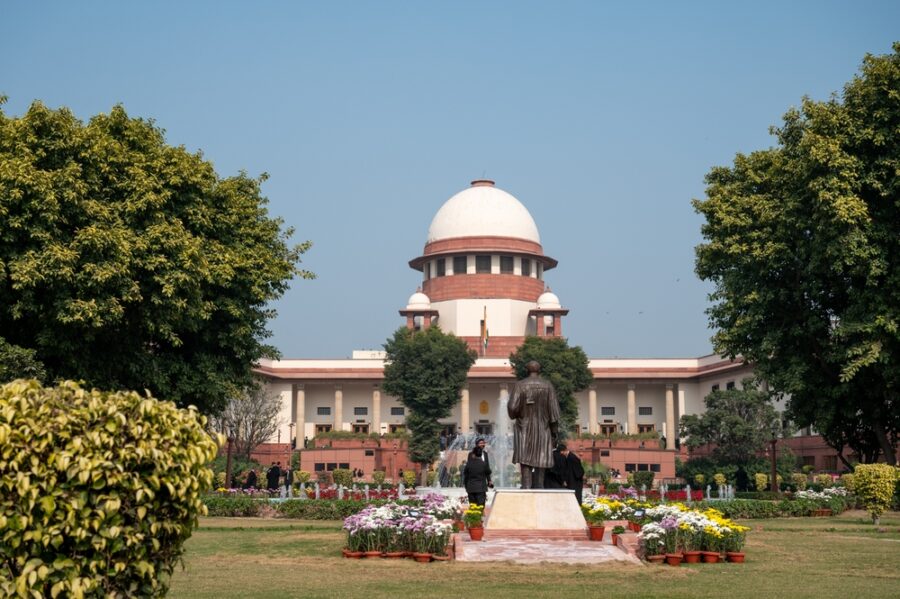Indian Supreme Court to hear public interest case against social games

The Supreme Court of India has agreed to hear public interest litigation seeking a nationwide ban on online gambling and betting platforms allegedly operating under the guise of e-sports and social games.
The litigation was filed on behalf of governance organization, the Centre for Accountability and Systemic Change, on October 13 and will be heard on Friday. It lists six respondents, including Apple and Google.
It calls on various government ministries, including Electronics and Information Technology, Information and Broadcasting, and the Ministry of Youth Affairs and Sports, to ensure a coordinated evaluation of the new Promotion and Regulation of Online Gaming Act 2025, as well as state laws used to prohibit gambling disguised as online skill or e-sports games.
The public interest litigation urges the government to clamp down on online gambling in what it calls a “national crisis” that leads to financial and health issues for “half of India’s population.”
The Reserve Bank of India, the National Payments Corporation of India, and its instant payment service, Unified Payments Interface, were also brought up and urged to stop allowing monetary transactions to unauthorized gaming platforms.
Other pleas included a probe into offshore operators for tax evasion, and protection of personal data, in which it blames Indian influencers and athletes for promoting such services, which lead to “cyber frauds, addiction, mental health disorder, and suicides.”
Charlotte Capewell brings her passion for storytelling and expertise in writing, researching, and the gambling industry to every article she writes. Her specialties include the US gambling industry, regulator legislation, igaming, and more.
Verticals:
Sectors:
Topics:
Dig Deeper
The Backstory
Mounting legal pressure on digital wagering
Courts and regulators across major markets are redrawing the boundaries of what counts as legal online gaming, creating a fast-shifting backdrop for operators, tech platforms and payment networks. In recent weeks and months, India has accelerated courtroom scrutiny of apps that blur the line between skill-based play and gambling, U.S. judges have reinforced states’ primacy over betting licenses despite federal approvals, and Latin America has tightened the definition of legality in online wagering. Together, the actions signal an era in which compliance hinges less on product labels and more on how money moves, how risks are disclosed and who actually has authority to greenlight betting-like activity on the internet.
The stakes are significant. From social casinos to esports-adjacent titles and event contracts, business models once treated as regulatory gray zones are being stress-tested through litigation. Operators face injunctions, payment blocks and reputational risk. Consumers could gain new remedies as courts revisit common-law doctrines in the wake of online gambling statutes. And in a platform economy where distribution runs through app stores and instant payments, intermediaries like Apple, Google and the UPI rail are being pulled into the frame.
India’s high court puts “skill vs. chance” under a spotlight
India’s Supreme Court has become a focal point for nationwide policy coherence after agreeing to hear a public interest litigation that seeks a ban on online gambling and betting platforms alleged to operate under the guise of esports and social games. The petition, filed Oct. 13 by the Centre for Accountability and Systemic Change, names Apple and Google among six respondents and urges coordinated enforcement across multiple ministries, from electronics to sports, while calling for a rigorous review of the Promotion and Regulation of Online Gaming Act 2025 and state prohibitions. The case also presses the Reserve Bank of India and the National Payments Corporation of India to cut off transactions on unauthorized sites, escalating pressure on payments rails to police the market. Read more about the petition’s sweeping scope and targets in the report, Indian Supreme Court to hear public interest case against social games, at Complete iGaming.
The high court is simultaneously weighing public harms framed around youth protection. In a separate plea, a petitioner asked the court to ban all online sports betting apps, citing suicides linked to betting debts and the role of celebrity promotion. While a bench acknowledged the social costs, it also questioned whether legislation alone could prevent harmful behavior, and referred the matter to the central government’s top legal officers. That nuanced stance underscores the court’s dual track: pushing the executive toward stronger oversight while probing the limits of prohibition. Details are in The Supreme Court of India hears plea to ban all online sports betting apps at Complete iGaming.
For global operators and domestic platforms, the convergence of these cases heightens compliance risks across content labeling, influencer marketing and KYC/AML, and raises the possibility that payment chokepoints could become the primary enforcement tool even before new national standards are formalized.
When federal approvals meet state walls in the U.S.
In the United States, a key tension is playing out between federal market permissions and state gambling licenses. A federal district judge in Maryland refused to block state regulators from enforcing gaming laws against Kalshi, the event-contracts marketplace that had secured Commodity Futures Trading Commission approval. The court found the company had not shown a likelihood of success on core elements of its defense, leaving in place Maryland’s position that any platform offering markets on sports outcomes must hold a state betting license. Kalshi has appealed to the Fourth Circuit. The decision affirms a growing state-first doctrine: CFTC oversight does not preempt state gambling regimes when products walk and talk like sports betting. See Federal district court rules against Kalshi in Maryland sports betting case at Complete iGaming.
That friction creates strategic choices for platforms straddling finance and gambling. Pursue 50-state licensing or restructure products to avoid sports exposure? Courts appear inclined to treat consumer experience and economic reality over formal labels, a trend mirrored in actions against sweepstakes models.
Consumer remedies broaden as courts revisit online gambling laws
A 7-0 ruling by the Michigan Supreme Court revived a gambler’s claim for $3.1 million in alleged unpaid online winnings, signaling that legalization can also expand consumer rights. In the case, a player alleged BetMGM voided winnings due to a “malfunction” in an online roulette game after allowing a $100,000 withdrawal. Lower courts sided with the operator, but the state’s high court reversed, holding that the Lawful Internet Gaming Act, passed to legalize online gambling, may require adapting common-law rules to contemporary digital contexts. The case returns to Wayne County Circuit Court for further proceedings, with the operator maintaining it does not comment on pending litigation. The implications are twofold: operating agreements that automatically void payouts on “malfunction” may face closer scrutiny, and regulators could be asked to clarify dispute-resolution pathways. Full coverage is in Gambler wins Michigan Supreme Court battle in US$3.1 million case against BetMGM at Complete iGaming.
The case highlights a broader shift in judicial posture. As states normalize online wagering, courts are increasingly willing to test boilerplate contract defenses against consumer-protection norms, especially where platform control over game code, uptime and payout logic can tilt bargaining power.
Global definitions tighten: Chile and California draw hard lines
Beyond the U.S. and India, courts are erecting sharper statutory guardrails. In Chile, the Supreme Court’s Third Constitutional Chamber ruled that all online gambling is illegal unless expressly authorized, ordering internet service providers to block illegal sites. The decision narrows the legal field to state-sanctioned lotteries, racetracks and licensed casinos, and arrives as lawmakers debate a regulatory bill for online wagering. Authorities estimate more than 900 platforms operate illegally, generating roughly $150 million a year. The move follows prior restrictions on sponsorships by betting companies in professional football, underscoring Chile’s trend toward preemptive enforcement while legislation remains in flux. See Chile’s Supreme Court clarifies online gambling laws at Complete iGaming.
In California, the Los Angeles City Attorney filed suit against Stake.us’s sweepstakes model, arguing that redeemable virtual currency and “free” credits still constitute gambling when players can convert outcomes to cryptocurrency or gift cards. The complaint seeks to halt operations and recover player losses, alleging the setup is a deceptive end-run around state gaming prohibitions. The case is part of a broader crackdown on sweepstakes casinos that monetize engagement while claiming nonwager status. Details are in Legal case filed against Stake.us in California court over sweepstakes model at Complete iGaming.
Together, Chile’s categorical stance and California’s focus on economic substance reflect a converging global test: if players risk value for a chance at redeemable rewards, courts are more likely to treat the product as gambling, with all attendant licensing and consumer-protection obligations.
What ties the cases together
Across jurisdictions, three themes recur. First, labels are losing potency. Whether a product is framed as esports, sweepstakes or event contracts, adjudicators look past nomenclature to how money and risk flow. Second, enforcement is moving upstream. Petitioners in India and prosecutors in the U.S. are targeting app distributors, payment rails and internet providers to cut off access even before formal legislative harmonization. Third, consumer protection is rising. From Michigan’s high court to Chile’s ISP blocks, authorities are expanding remedies and tightening access in the name of public health and fair play.
For operators, that means reconciling product design with a patchwork of state and national rules, preparing for payment interdictions and building more robust dispute processes. For policymakers, it raises the urgency of clear statutory definitions that distinguish skill, chance and hybrid models without ceding ground to opaque monetization. And for platforms and processors, the message is clear: distribution and payments confer responsibility, not just reach.








